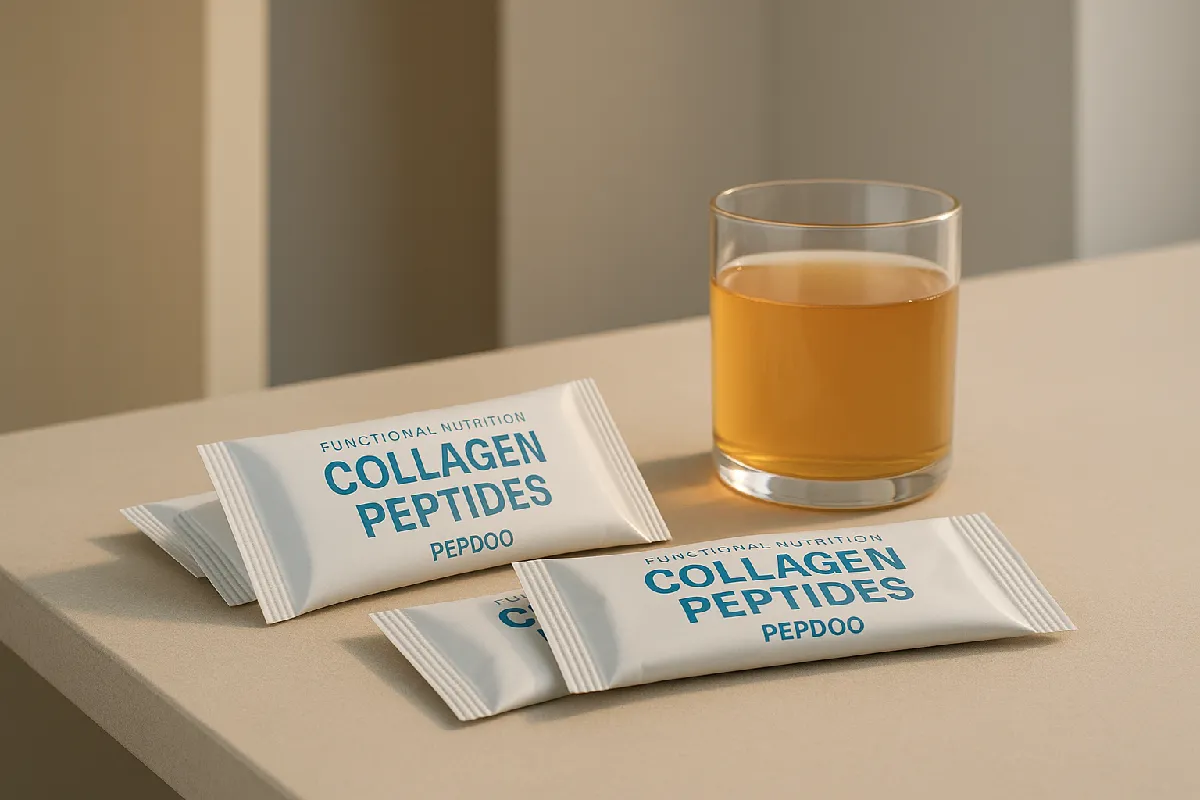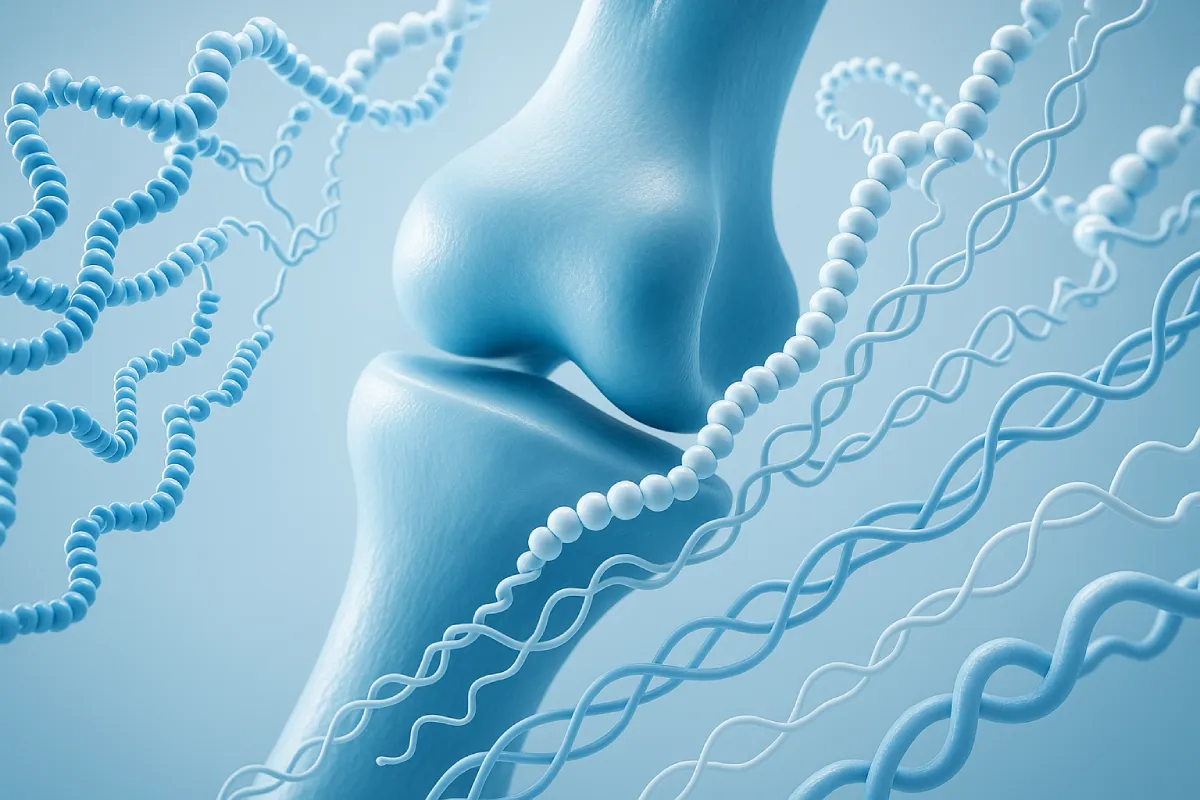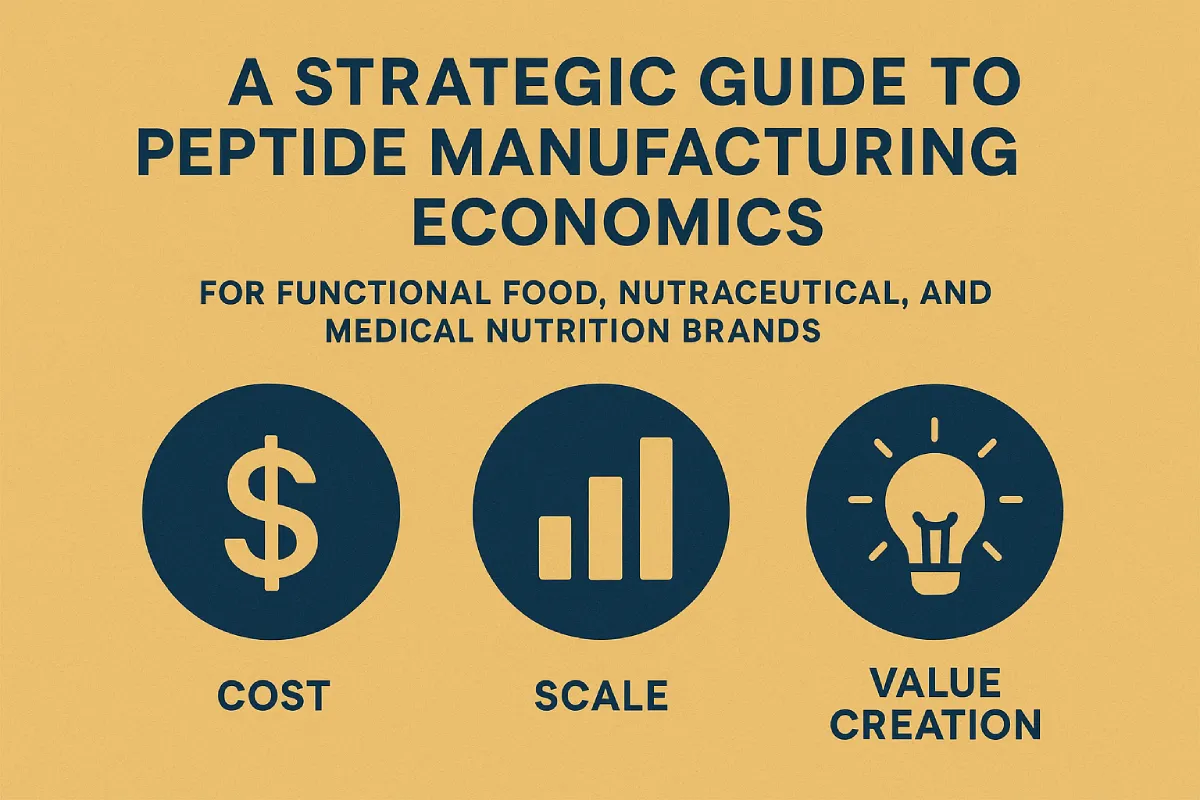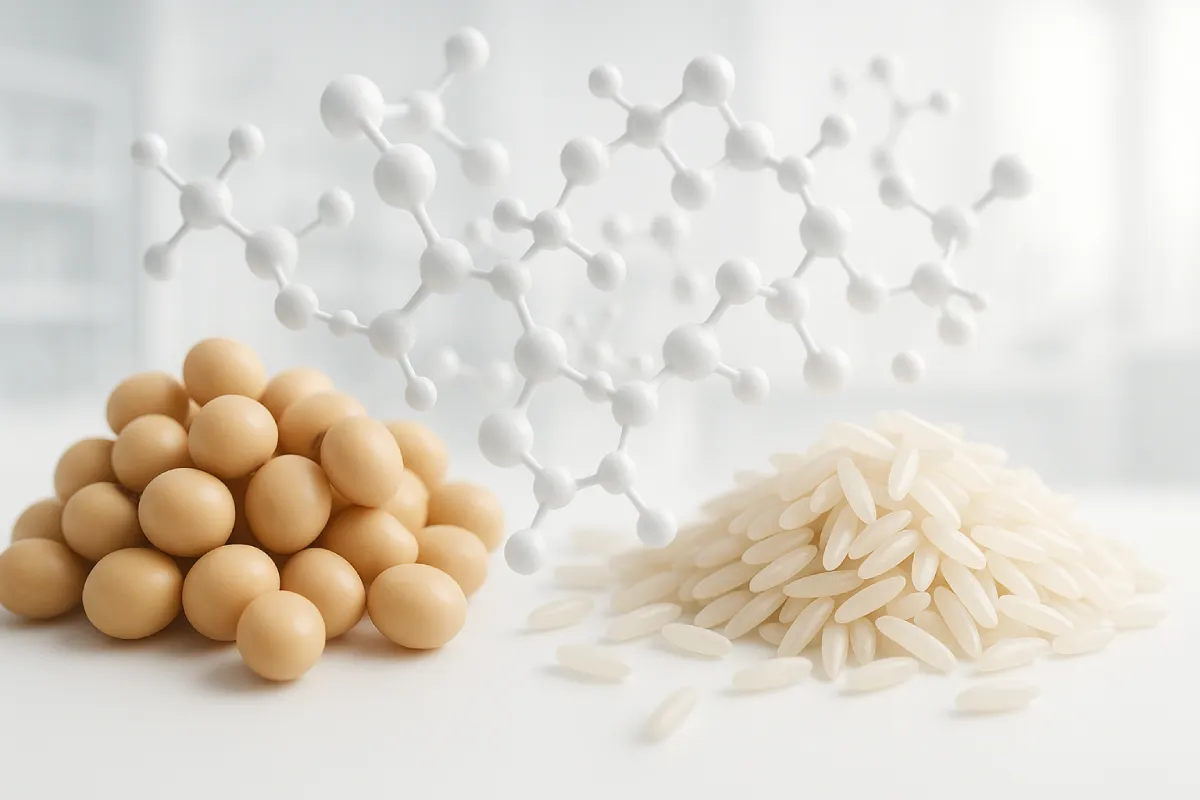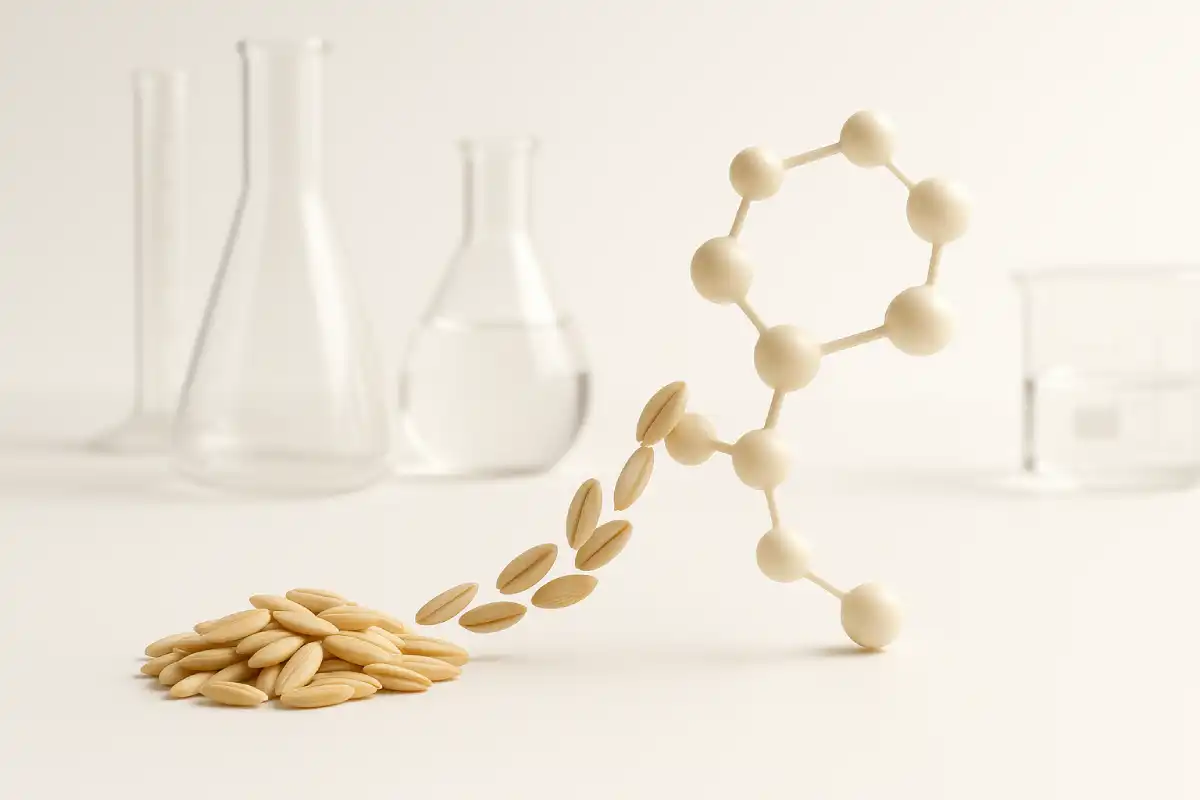1. Pea Peptides in Weight Management: Science-Backed Plant-Based Solutions
The rising prevalence of obesity and metabolic disorders has become a global health challenge, driving demand for effective, safe, and sustainable weight management solutions. Consumers increasingly seek plant-based protein sources that offer targeted functional benefits—appetite regulation, improved metabolic profile, and muscle preservation—beyond simple caloric substitution.
Pea peptides—bioactive short-chain amino acid sequences derived from enzymatically hydrolyzed pea protein—are emerging as a highly functional ingredient in the weight management sector. Their plant-based origin, combined with demonstrated metabolic benefits, positions them as a compelling choice for functional food, dietary supplement, and medical nutrition (FSMP) formulations.
As a full-category peptide manufacturer, China’s functional peptide industry standard setter, and one of the companies with a leading number of small-molecule peptide patents in China, we deliver end-to-end solutions powered by China-leading, internationally advanced peptide production technology. Our objective is to enable B2B brands with robust, scalable, and science-backed ingredients for market differentiation.
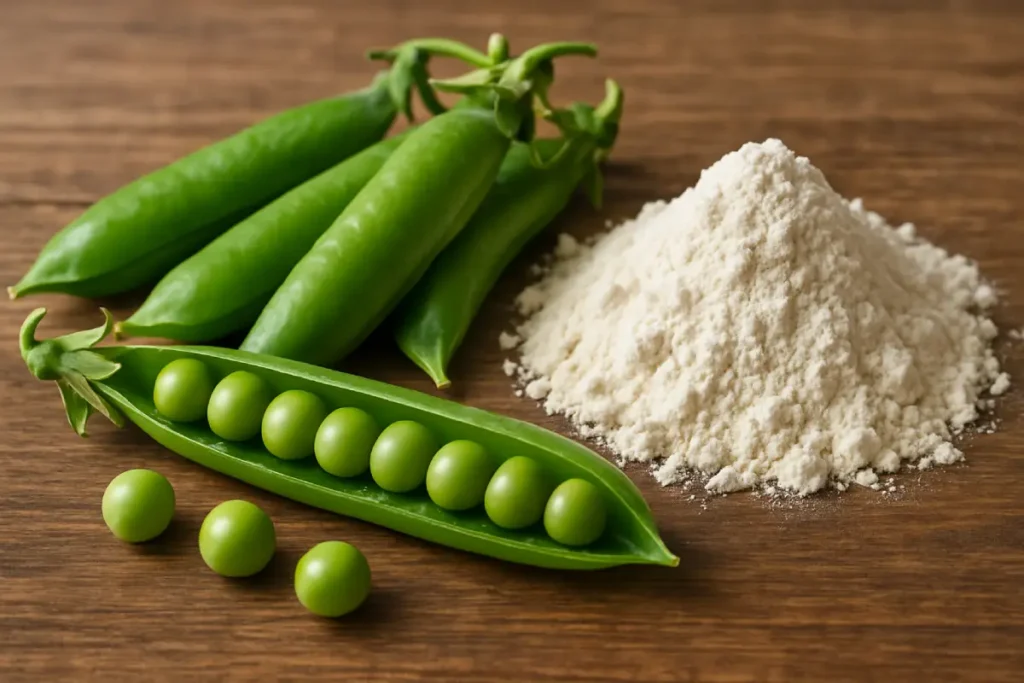
2. Understanding Pea Peptides
Definition & Source
Pea peptides are obtained through controlled enzymatic hydrolysis of yellow pea protein (Pisum sativum), breaking down long protein chains into bioactive peptides with low molecular weight. These peptides retain essential amino acids, have improved solubility, and exhibit higher bioavailability compared to native proteins [1].
Nutritional & Functional Features
- Complete Amino Acid Profile – Rich in branched-chain amino acids (BCAAs) and arginine, which support muscle maintenance and vascular health.
- High Digestibility – Smaller molecular size enhances absorption efficiency.
- Hypoallergenic – Suitable for sensitive populations, including those with dairy or soy intolerance.
Manufacturing Excellence
Leveraging China’s leading and internationally advanced peptide production technology, we apply multi-enzyme directional hydrolysis to control molecular weight distribution precisely. This ensures optimal functional activity for weight management applications. Our production complies with global standards including ISO22000, FSSC22000, HALAL, and KOSHER certifications, enabling seamless integration into international markets.
3. Mechanisms of Pea Peptides in Weight Management
3.1 Appetite Regulation
Pea peptides can stimulate the release of satiety hormones such as glucagon-like peptide-1 (GLP-1) and cholecystokinin (CCK) while reducing ghrelin levels, the hormone responsible for hunger signals [2]. This dual action promotes feelings of fullness, reducing overall caloric intake.
3.2 Metabolic Enhancement
Rich in BCAAs, pea peptides support lean muscle mass, which is essential for maintaining a higher basal metabolic rate (BMR). Muscle tissue burns more calories at rest than fat, contributing to more efficient energy expenditure [3].
3.3 Fat Absorption Modulation
Certain sequences within pea peptides have been shown to inhibit pancreatic lipase activity, thereby reducing the breakdown and absorption of dietary fats [4]. This can support gradual fat mass reduction when combined with balanced nutrition.
3.4 Anti-inflammatory & Antioxidant Effects
Chronic low-grade inflammation is closely linked to obesity and metabolic syndrome. Pea peptides exhibit antioxidant and anti-inflammatory activity, helping to improve metabolic environments and support long-term weight control [5].
R&D note: Our patent-leading small-molecule peptide platform enables tailoring of peptide molecular weight and bioactive profile to emphasize satiety, metabolic support, or lipid interaction, matching formulation goals for different product concepts.
4. Scientific Evidence & Clinical Studies
A growing body of evidence supports the role of pea peptides in weight management:
- Animal Studies – Rat models have demonstrated that pea peptide supplementation can significantly reduce body fat accumulation, improve insulin sensitivity, and modulate gut hormones [6].
- Human Trials – Clinical data show that daily supplementation with pea peptides can lead to reductions in BMI, waist circumference, and body fat percentage when combined with lifestyle interventions [7].
- Comparative Efficacy – In certain studies, pea peptides showed similar or superior effects on satiety compared to soy peptides or whey peptides, with the added advantage of being allergen-friendly [8].
As an industry standard setter, we collaborate with academic and clinical partners to validate peptide efficacy and support guideline development. This partnership model strengthens product claims and helps downstream brands navigate regulatory substantiation requirements.
Keywords: pea peptide clinical research, weight management peptide study

5. Formulation & Application in Functional Products
Dosage Forms
Pea peptides are compatible with a wide range of formats:
- Instant powder drink mixes and beverage concentrates
- Nutrition or meal-replacement bars
- Tablets and capsules
- Ready-to-drink functional beverages and RTD shots
Formulation Synergies
Effective pairings include green tea extract (thermogenic support), L-carnitine (fat metabolism), soluble dietary fibers (viscous satiety effect), and probiotics (gut health modulation). Synergistic design should be guided by target claims (satiety vs. metabolic optimization vs. lipid modulation).
Sensory & Process Considerations
To ensure consumer acceptance, use taste-masking, instant solubility technologies, and microencapsulation where necessary. Our production capabilities support tailored fractionation that balances functionality with sensory profile for beverages and solid formats alike.
B2B advantage: As a full-category peptide producer, we provide end-to-end OEM/ODM services—technical dossiers, pilot batches, scale-up support, and documentation for multi-market regulatory filings.
Keywords: functional food ingredients, peptide powder for weight loss, plant protein blend
6. Advantages of Partnering with a Professional Peptide Manufacturer
- Supply chain control: vertical integration from raw pea sourcing to finished product minimizes variability and secures supply continuity.
- Advanced manufacturing: multi-enzyme directional hydrolysis, low-temperature bioactivity preservation, and precision molecular fractionation.
- Regulatory readiness: quality systems and certifications that support cross-market entries (China, EU, USA, Japan, etc.).
- Custom R&D: formulation, claim support, clinical partnerships, and analytical method development.
As a full-category peptide manufacturer, a leader in small-molecule peptide patents, and holder of internationally advanced peptide technologies, we deliver not only ingredients but integrated solutions—helping B2B brands accelerate product development and create differentiated value propositions in crowded markets.
Keywords: pea peptide manufacturer, bulk peptide supplier, custom peptide solutions
7. Market Outlook & Opportunities
The weight management ingredient market is expected to expand as plant-based trends, clinical substantiation, and consumer demand for functional benefits converge. Pea peptides combine sustainability credentials with evidence-backed performance and can be positioned across multiple price and efficacy tiers to meet diverse consumer segments.
For B2B brands, early adoption of clinically supported pea peptide fractions—paired with compelling formulation stories and third-party validation—can be a strong differentiation strategy.
Brand vision: we aim to partnership with global brands to co-develop next-generation functional nutrition products that are effective, safe, and competitive.
8. Conclusion
Pea peptides represent a potent, sustainable, and scientifically validated ingredient for modern weight management products. Their multifunctional benefits—ranging from appetite control to metabolic support—make them a valuable addition to functional food, supplement, and medical nutrition formulations.
As China’s functional peptide industry standard setter and a global leader in small-molecule peptide innovation, we combine research excellence with large-scale manufacturing to deliver competitive advantages for our B2B partners.
For sample requests, technical support, and customized formulation services, contact us to explore how our China-leading, internationally advanced peptide technology can power your next product innovation.
Unlock Market-Ready Weight Management Solutions with Pea Peptides
As China’s leading full-category peptide manufacturer, industry standard setter, and patent holder in small-molecule peptides, we deliver science-backed, plant-based solutions to power your brand’s growth.
- ✔ 100% plant-based, allergen-free
- ✔ Clinical-backed weight management benefits
- ✔ Customized formulation & blend options
- ✔ Scalable production with international quality standards
FAQ
For most functional foods and dietary supplements, pea peptides are typically included at 1–5 grams per serving, depending on the desired functional claim and target market regulations. For weight management products, clinical research suggests a daily intake of 2–3 grams can support satiety and protein supplementation [1]. However, formulation should consider local regulatory limits and synergistic ingredients.
Yes. Pea peptides are often formulated with green tea extract, L-carnitine, dietary fiber, or other plant-based peptides (such as soy or rice peptides) to create synergistic effects in satiety, metabolism, and fat oxidation. As a full-category peptide manufacturer and China's peptide industry standard setter, we offer custom blending solutions with patented enzymatic hydrolysis and fermentation technologies to ensure maximum bioactivity.
Direct sourcing from a pea peptide manufacturer ensures stable quality, competitive pricing, and full traceability. As a leading peptide factory in China with internationally advanced production lines, we provide bulk supply, consistent molecular weight distribution, and technical documentation (COA, MSDS, amino acid profile, heavy metal tests) to support your R&D and regulatory compliance.
Yes. Due to their hypoallergenic profile, high digestibility, and plant-based origin, pea peptides are widely used in FSMP formulations for patients with protein digestion issues or specific metabolic conditions. Our patented small-molecule peptide technology ensures bioavailability and compliance with both GB standards and international FSMP regulations.
For bulk orders, our standard lead time is 2–4 weeks depending on order volume and packaging specifications. MOQ typically starts at 25 kg, but for formulation trials, we can provide smaller R&D batches. As a China pea peptide supplier with strong production capacity, we ensure on-time delivery and global shipping support.
Absolutely. We support B2B clients not only with raw materials but also with formulation guidance, clinical data references, marketing claims compliance, and international export documentation. Our R&D team collaborates closely with your product development department to accelerate your market launch.
References
[1] Bouglé, D., & Bouhallab, S. (2017). Dietary bioactive peptides: Human studies. Critical Reviews in Food Science and Nutrition, 57(2), 335–343.
[2] Hall, W. L., Millward, D. J., Long, S. J., & Morgan, L. M. (2003). Casein and whey exert different effects on plasma amino acid profiles, gastrointestinal hormone secretion and appetite. British Journal of Nutrition, 89(2), 239–248.
[3] Phillips, S. M. (2014). A brief review of critical processes in exercise-induced muscular hypertrophy. Sports Medicine, 44(1), 71–77.
[4] Sugano, M., & Goto, S. (1990). Steroid binding proteins in foodstuffs. Journal of Nutrition, 120(6), 691–699. https://doi.org/10.1093/jn/120.6.691
[5] Nongonierma, A. B., & FitzGerald, R. J. (2015). The scientific evidence for the role of milk protein-derived bioactive peptides in humans: A review. Journal of Functional Foods, 17, 640–656.
[6] Jakubowicz, D., et al. (2013). High protein breakfast prevents body fat gain, increases satiety, and reduces daily caloric intake. Obesity, 21(12), 2502–2509. https://doi.org/10.1002/oby.20440
[7] Pal, S., Ellis, V., & Dhaliwal, S. (2010). Effects of whey protein isolate on body composition, lipids, insulin and glucose in overweight and obese individuals. British Journal of Nutrition, 104(5), 716–723.
[8] Martínez-Villaluenga, C., & Hernández-Ledesma, B. (2020). Pea protein hydrolysates: Functional properties and potential applications in the food industry. Food Research International, 137, 109460.
[9] Grand View Research. (2024). Weight Management Market Size, Share & Trends Analysis Report.


